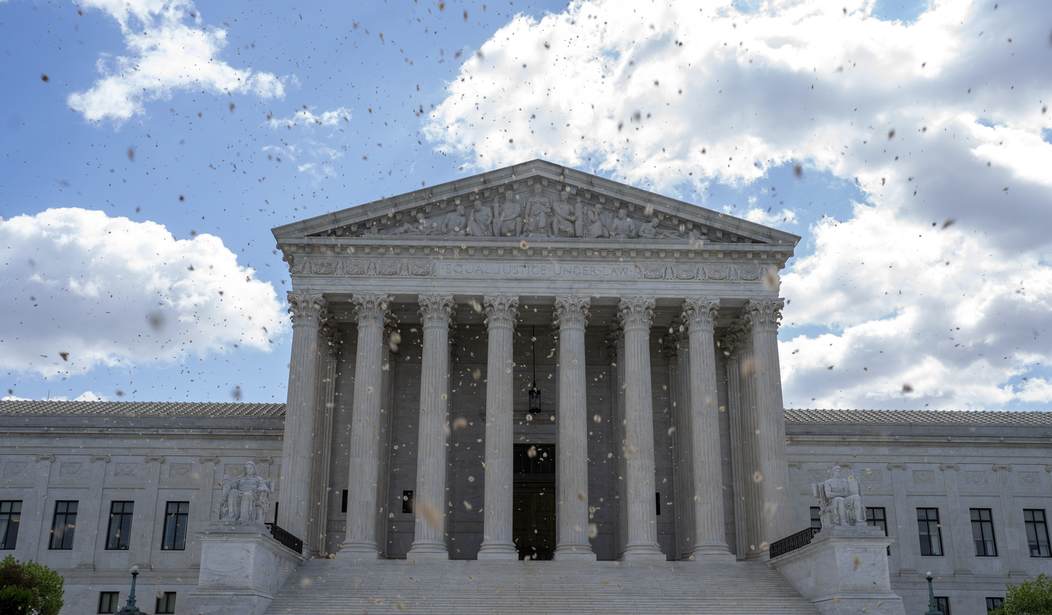FOR THE first time since 1973, the Supreme Court will decide whether a broad abortion ban — not just a regulation restricting its availability, funding, or method — is legal. If a majority of the court upholds a Mississippi law banning non-emergency abortions after 15 weeks of pregnancy, a key pillar of US abortion policy for the past half century will fall.
Across the political spectrum, therefore, the case — Dobbs v. Jackson Women's Health Organization — is being seen as a watershed in the nation's long conflict over abortion.
"This case is a direct threat to Roe v. Wade," declared NARAL Pro-Choice America. "It doesn't get any scarier than this." Leading Democrats, blasting the court's decision to hear the case, have warned that "the consequences will be devastating" if the Mississippi law is sustained, that women's rights "are under attack and threatened," and that "Congress must step up to enshrine Roe into federal law."
From the right, meanwhile, have come cheers at the prospect of Roe's demise. Republican stalwart Henry Olsen wrote in the Washington Post that "the court should ... do its constitutional duty: Uphold the law and overturn Roe." Senator James Lankford of Oklahoma, deploying the hashtag "#ProLife," hailed the justices' decision to hear the Mississippi case as "a huge step forward." Editorialized National Review, the prominent conservative journal: "A majority of the Court knows that Roe is nonsense. It is past time for the justices to say so."
So the partisan battle lines couldn't be clearer. Republicans want an end to Roe and the abortion regime it instituted; Democrats want them upheld.
Recommended
But is that — in political terms — what they should want?
For many people, of course, the issue of abortion is not about politics but about right and wrong. Millions of Americans regard the protection of life in the womb as a moral imperative; millions of others feel the same way about protecting a woman's right to end an unwanted pregnancy. As Gallup has documented for years, the public splits down the middle when respondents are asked whether they consider themselves "pro-choice" or "pro-life."
Still, there is no denying that abortion has become intensely politicized, in a way it never was before Roe was decided nearly 50 years ago. And not only politicized, but polarized. In the Roe era, the GOP became explicitly antiabortion: Its platform proclaims "that the unborn child has a fundamental right to life which cannot be infringed" and advocates amending the Constitution to ban nearly all abortions. Democrats, meanwhile, became adamant defenders of unrestricted abortion rights, which their platform supports "unequivocally."
Unlike the two parties, most Americans are not nearly so absolutist. Survey data is remarkably consistent: Broadly speaking, voters want abortion to be legal early in pregnancy or when there is a medical emergency, but are against both banning abortion outright or permitting it without limit. That's probably what abortion policy in the United States would look like today, if the Supreme Court hadn't snatched the whole issue out of the political arena and carved a sweeping "right to choose" into constitutional granite. In most developed nations, abortion is permitted along lines roughly comparable to the Mississippi law. And because the policy was shaped through democratic debate and politics, it enjoys broad acceptance, rarely if ever generating the intense fury and turmoil we experience in this country.
Paradoxically, Roe has proved a boon to the Republican Party that so fervently condemns it. As long as the high court has declined to overturn or substantially curtail its 1973 landmark, GOP politicians have been able to talk the talk of anti-abortion extremism, without having to face the repercussions of walking the walk. With Roe in force, Republicans have been able to clamor for laws that would ban most abortions, secure in the knowledge that they won't be allowed to stand. They have also been able to promote the kind of reasonable regulations most voters do support, such as requiring parental consent for minors or barring abortion for sex-selection, knowing that Democrats will take the unpopular stand of opposing them.
But if Roe is overthrown, Republicans will lose the ability to call, cost-free, for sweeping prohibitions on abortion. If the issue returns to the political arena, GOP leaders will face a painful dilemma: Do they betray their fervent pro-life base, or pay the price of ignoring the far larger, but much less doctrinaire, mainstream?
For Democrats, by contrast, an end to Roe would mean liberation from always having to defend the most inflexible prochoice positions. No longer locked into defending Roe at all costs, Democrats would be free to support the moderate abortion regulations that most Americans are comfortable with. And they could stop excommunicating the pro-life Democrats who were once such a significant component of the party.
Those who wish for an end to Roe and those who wish to see it affirmed may well be deeply sincere. All the same, a post-Roe world is apt to be less congenial to the GOP that craves it, and not nearly as challenging to the Democratic Party that doesn't.

























Join the conversation as a VIP Member